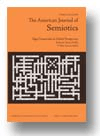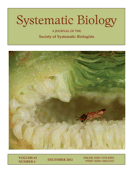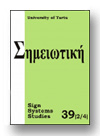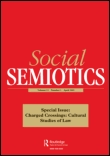
Biosemiotics
Scope & Guideline
Unlocking the Semiotic Secrets of the Living World
Introduction
Aims and Scopes
- Interdisciplinary Exploration of Semiotics and Biology:
The journal focuses on the integration of semiotic concepts with biological processes, analyzing how organisms create and interpret signs within their environments. - Umwelt Theory and Its Applications:
A significant theme in the journal is the exploration of Jakob von Uexküll's Umwelt theory, which examines how different species perceive their environments and interact with them through semiotic processes. - Ethology and Behavior Analysis:
Biosemiotics emphasizes the study of animal behavior from a semiotic perspective, investigating how animals communicate and interpret signals in their social and ecological contexts. - Aesthetic and Philosophical Dimensions of Biosemiotics:
The journal addresses the philosophical implications of biosemiotic theories, including discussions on aesthetics, consciousness, and the nature of agency in living systems. - Ecosemiotics and Environmental Interactions:
Research within the journal often explores the semiotic relationships between organisms and their ecosystems, contributing to a broader understanding of ecological dynamics.
Trending and Emerging
- Interspecies Communication and Collaboration:
Increasingly, papers are focusing on the dynamics of communication between different species, particularly in urban and altered environments, indicating a trend towards understanding multispecies interactions. - Integration of Technology with Biosemiotic Research:
There is a growing interest in how technology, including AI and computational models, can enhance our understanding of semiotic processes in biological systems, reflecting contemporary advancements in research methodologies. - Phenomenological Approaches to Biosemiotics:
Recent works are exploring phenomenology as a lens for understanding lived experiences of organisms, particularly in relation to their Umwelt, indicating a trend towards more subjective interpretations of biological phenomena. - Aesthetic Dimensions of Semiotics:
Emerging themes are increasingly addressing the aesthetic aspects of semiotics, exploring how beauty and artistic expression relate to biological communication and perception, thereby bridging art and science. - Ecological and Environmental Concerns:
Research is trending towards ecosemiotic approaches that examine the signs and meanings within ecological interactions, emphasizing the importance of understanding communication in conservation and environmental contexts.
Declining or Waning
- Reductionist Approaches to Semiosis:
Earlier works that focused on a strictly reductionist view of semiotic processes, primarily linking them to mechanistic interpretations of biology, are becoming less frequent as the field embraces more holistic and integrative approaches. - Traditional Evolutionary Models:
There seems to be a waning interest in classical evolutionary models that do not incorporate semiotic analysis, as newer frameworks that integrate meaning-making processes gain traction. - Overemphasis on Human-Centric Studies:
Research narrowly focused on human interpretations of semiotics is decreasing, with a growing emphasis on non-human agents and their communicative practices in various ecological contexts.
Similar Journals

AMERICAN JOURNAL OF SEMIOTICS
Unlocking the Power of CommunicationThe American Journal of Semiotics is a pivotal publication in the field of semiotic studies, focusing on the intricate relationships between signs and meanings across various disciplines. Published by the Philosophy Documentation Center, this journal disseminates vital research and theoretical advancements that contribute to a deeper understanding of language, communication, and cultural interpretations. Although the journal has had a period of coverage in Scopus from 1996 to 2018, it continues to hold relevance with notable rankings in the Arts and Humanities and Social Sciences categories, showcasing its diverse scholarly impact. The journal aims to engage researchers, professionals, and students through a rigorous exploration of semiotic theory and its applications, reinforcing its position as a significant resource in the academic landscape.

Filozofia Nauki
Fostering Critical Discourse on Science and PhilosophyFilozofia Nauki is a distinguished academic journal published by the Institute of Philosophy at Warsaw University, Poland, with a dedicated focus on the interdisciplinary realms of Philosophy and the History and Philosophy of Science. Since its transition to Open Access in 2020, the journal has broadened its reach, allowing scholars worldwide to engage with its content without barriers. The journal boasts an important standing in the academic community, currently ranked Q2 in Philosophy and Q3 in History and Philosophy of Science as of 2023, reflecting its impact and relevance. With an H-Index indicating its citation influence, the journal aims to foster critical discourse, sharing innovative research and ideas that push the boundaries of knowledge in these fields. Its Scopus rankings, with a percentile of 58th in Philosophy and 41st in the History and Philosophy of Science, further highlight its growing prestige. As it continues to publish cutting-edge research, Filozofia Nauki stands as a vital resource for researchers, professionals, and students committed to exploring the philosophical dimensions of scientific inquiry, ensuring a robust forum for discussion and discovery.

Intersezioni
Fostering Insightful Dialogues in HumanitiesIntersezioni, published by SOC ED IL MULINO, is a prominent Italian journal in the domains of Arts and Humanities and Cultural Studies. With an ISSN of 0393-2451 and an E-ISSN of 1973-8196, this journal provides a platform for scholarly discussions and innovative research while maintaining a steadfast commitment to high academic standards since its inception. The journal's historical commitment is reflected in its converged years from 1981 to 1983, 1987 to 1989, and now 1997 to 2024. Noteworthy for its impact in the field, it holds a Q3 ranking in both Arts and Humanities (miscellaneous) and Cultural Studies for 2023. This positions the journal as a valuable outlet for researchers, professionals, and students looking to engage with contemporary issues and theories that shape cultural discourse today. While it is not an open-access journal, its contributions continue to be vital in enriching academic dialogue and fostering insights in the humanities landscape, recognized by its Scopus rankings in social sciences and general arts and humanities.

Biological Theory
Innovating Perspectives on Biological TheoryBiological Theory is an esteemed academic journal published by Springernature, focusing on the interdisciplinary realms of ecology, evolution, behavior, and philosophy of science. With an ISSN of 1555-5542 and an E-ISSN of 1555-5550, the journal had its converged years from 2006 to 2011 and from 2013 to 2024, reflecting its commitment to ongoing scholarly dialogue. Notably, it holds a prestigious Q2 ranking in Ecology, Evolution, Behavior and Systematics, and an impressive Q1 ranking in History and Philosophy of Science, highlighting its influential role in shaping discussions across these fields. The journal is well-received in the academic community, with Scopus rankings placing it in the 88th percentile for History and Philosophy of Science and the 59th percentile for Ecology, demonstrating its broad impact and relevance. Researchers, professionals, and students can access cutting-edge theories and critical analyses of biological concepts that contribute to a deeper understanding of life sciences without an open access model, further emphasizing the journal's significance in both historical and contemporary scientific discourse.

Systematic Biology
Connecting the dots in the web of life and its systems.Systematic Biology is a premier journal published by Oxford University Press, dedicated to advancing the field of systematic biology through rigorous research and comprehensive reviews. Established in 1952, this esteemed journal has become a cornerstone of scholarship in Ecology, Evolution, Behavior and Systematics and Genetics, consistently ranking in the Q1 category as of 2023. With an impressive Scopus ranking—19th in Ecology and Evolution and 23rd in Genetics—Systematic Biology offers a platform for the dissemination of groundbreaking research, novel methodologies, and critical discussions that shape our understanding of biological diversity and evolution. While the journal does not currently offer open access options, it maintains a strong commitment to quality and integrity in publishing, ensuring that every article contributes meaningfully to the scientific community. Researchers, professionals, and students alike will find valuable insights and a wealth of knowledge within its pages, supporting their work and fostering a deeper appreciation for the intricate web of life.

DEGRES-REVUE DE SYNTHESE A ORIENTATION SEMIOLOGIQUE
Navigating the Complexities of Language and MeaningDEGRES-REVUE DE SYNTHESE A ORIENTATION SEMIOLOGIQUE, published by DEGRES, serves as a significant platform for scholarly exploration in the fields of Linguistics and Philosophy. Fostering critical discourse and innovative ideas, this journal has been an essential resource for researchers and students alike, particularly in Belgium since its inception. Although it is indexed in the fourth quartile across its respective categories, it is notable for its contributions to the semiological methodology that intertwines language and philosophical inquiry. The journal's comprehensive archive spans from 2002 to 2014 and resumes from 2016 to 2023, providing ample content for those delving into semiotic theories and practical studies. While the journal does not offer open access, it remains a vital repository for burgeoning linguistic and philosophical research. Here, academics can engage with novel insights and enrich their understanding of the communicative processes shaping human interaction.

Sign Systems Studies
Bridging Theories and Practices in Language ResearchSign Systems Studies is a premier interdisciplinary journal published by Tartu University Press, focusing on the intricate relationships between language, meaning, and communication. With an ISSN of 1406-4243 and an E-ISSN of 1736-7409, this esteemed publication has been an open-access resource since 2009, ensuring that cutting-edge research is accessible to a global audience. Based in Estonia, this journal has made significant strides in the field of Linguistics and Language, achieving a Q1 category ranking in 2023 and impressive Scopus rankings in both Arts and Humanities and Social Sciences. The journal not only fosters scholarly discourse but also encourages innovative research methodologies across its scope. With its continual growth and impactful contributions recognized worldwide, Sign Systems Studies plays a vital role in advancing the understanding of language systems, making it an invaluable resource for researchers, professionals, and students dedicated to the study of linguistics.

Social Semiotics
Decoding Meanings in a Complex Cultural LandscapeSocial Semiotics, published by Routledge Journals, Taylor & Francis Ltd, is a leading academic journal dedicated to the dynamic interplay of language, culture, and communication. Since its inception in 1991, the journal has showcased innovative research at the intersection of sociolinguistics, semiotic theory, and cultural studies, offering critical insights into how meanings are constructed and conveyed in various socio-cultural contexts. As a testament to its academic rigor, Social Semiotics holds a distinguished position in the 2023 category quartiles, achieving Q2 in Communication, Q1 in Cultural Studies, and Q1 in Linguistics and Language. Furthermore, its exceptional Scopus rankings place it in the top tiers of its fields, with notable percentiles across multiple categories, making it an essential resource for researchers, professionals, and students alike. Although currently not open access, the journal's articles are widely considered pivotal for understanding contemporary issues in communication and cultural theory. For those engaged in the study of semiotics, Social Semiotics remains an indispensable platform for scholarly dialogue and advancement.

deSignis
Exploring the Intersection of Semiotics and DesigndeSignis is a distinguished open-access journal published by the Federación Latinoamericana Semiotic, dedicated to advancing the field of semiotics and design. With its ISSN 1578-4223 and E-ISSN 2462-7259, deSignis serves as a crucial platform for researchers, practitioners, and students seeking to explore the intricate relationships between sign systems and design processes. Since its inception in 2004, this journal has fostered diverse scholarly discourse, contributing significantly to the understanding of visual culture, communication theories, and aesthetic practices. Its commitment to open access ensures that high-quality research is accessible to a global audience, promoting collaboration and innovation. Located in Paris, France, deSignis continues to be a vital resource for those interested in the interdisciplinary applications of semiotics in contemporary design.

Biology-Basel is a premier, peer-reviewed open-access journal published by MDPI since 2012, situated in the heart of Switzerland. With an E-ISSN of 2079-7737, this journal serves as a vital platform for the dissemination of innovative research across the broad spectrum of Agricultural and Biological Sciences, Biochemistry, Genetics, Molecular Biology, and Immunology. Recognized for its rigorous editorial standards and impactful findings, it currently ranks Q1 in Agricultural and Biological Sciences and holds impressive positions in several categories according to the 2023 Scopus rankings. The journal’s open-access model ensures that high-quality research is freely available to a global audience, fostering collaboration and knowledge sharing among researchers, professionals, and students alike. Spanning from 2012 to 2024, Biology-Basel is committed to reflecting the latest advancements in biological sciences, making it an essential resource in the ever-evolving landscape of biological research.